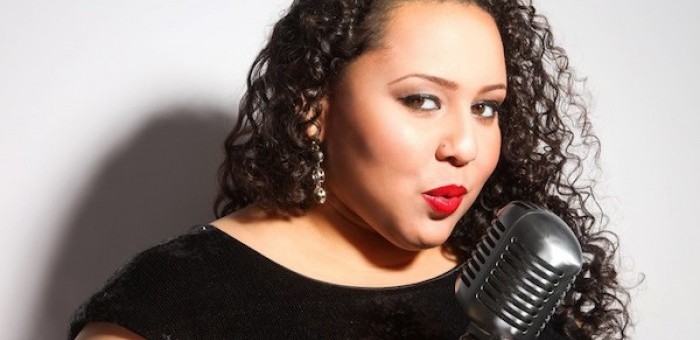Jan 13, 2026 2:09 PM
More Trump-Kennedy Center Cancellations
The fallout from the renaming of the John F. Kennedy Center for the Performing Arts to include President Donald…

Brianna Thomas
(Photo: Courtesy of the artist)Vocalist Brianna Thomas has been heralded as one of today’s rising young jazz talents. Although her style nods to bygone eras, Thomas passionately tells her own story, one that is very much rooted in today’s times of uncertainty.
Alongside Catherine Russell and Charenée Wade, Thomas rounds out a trio of vocalists in the Jazz at Lincoln Center-penned project “Lady Sings The Blues,” a touring act that incorporates rare music from early female blues pioneers such as Bessie Smith, Ida Cox and Victoria Spivey.
DownBeat sat down with Thomas following her performance of “Lady Sings The Blues” at this year’s Caramoor Jazz Fest in Katonah, New York. Thomas, 33, discussed her journey from growing up in Peoria, Illinois, to performing around the world.
Tell us about your early life and how you became a singer.
I was born and raised in Peoria and I didn’t leave until I was 21. I lived in Chicago, which is three hours away, for about a year when I was 19. My father, Charlie “CJ” Thomas, was a vocalist and drummer …. When I was like 1 or 2, I would be right in there at the club, walking around while my dad was playing. I also remember him having rehearsals at the house. When I was 6, I sang “What A Wonderful World” with his band. It was my first time on stage.
My dad had Alzheimer’s and he died in February 2015. I was on my way home for Christmas right before he passed away. I was at the airport waiting for the plane and someone sent a video clip to my inbox on Facebook. It was a clip of my dad singing in the 1980s. I hadn’t heard his speaking voice since I was 16 or 17 because he had [suffered] some strokes. He could still speak but not the same. I was so in tears that I missed my flight.
I shared the clip with another vocalist/friend of mine, and they immediately texted me back and said, “Man, your vowel sounds are just alike. You sound like him.” I feel like I carry him with me in spirit and in song.
You often perform with pianist Conun Pappas Jr., with whom you have great chemistry. What does Pappas give you that allows for such harmonious interaction?
Conun is like any good friend who will tell you the truth. He’ll tell you the good and the bad when he needs to; he lets you be you and enjoys you for who you are. It’s that kind of relationship with us, a reciprocal one, that I genuinely enjoy. He has an amazing imagination and an openness to ideas—which for me is essential. We both love sound and how sound makes us feel. And we like to incorporate whatever sound is for the moment, and sometimes we have to search out that thing and find it. He has been quite the blessing as a piano player and a friend.
How do you approach jazz standards so that they resonate with today’s audience?
I just try to take sounds that make me feel some kind of way and translate that feeling. The standards that I sing have [lyrics that] paint a picture of feelings. Every song has more than one story. … For instance, “The Nearness Of You.” Many people think of this song as very happy, an “I’m in love with you” song. But there’s also this: “I need no soft light to enchant me, if you’d only grant me…” One person can sing it and five minutes later, another person could sing and give you an entirely different experience because there are so many stories in a song. The thing that lures me to jazz is that it is of the moment. It’s always been of the moment. There’s such freedom in that.

Belá Fleck during an interview with Fredrika Whitfield on CNN.
Jan 13, 2026 2:09 PM
The fallout from the renaming of the John F. Kennedy Center for the Performing Arts to include President Donald…

Peplowski first came to prominence in legacy swing bands, including the final iteration of the Benny Goodman Orchestra, before beginning a solo career in the late 1980s.
Feb 3, 2026 12:10 AM
Ken Peplowski, a clarinetist and tenor saxophonist who straddled the worlds of traditional and modern jazz, died Feb. 2…

The success of Oregon’s first album, 1971’s Music Of Another Present Era, allowed Towner to establish a solo career.
Jan 19, 2026 5:02 PM
Ralph Towner, a guitarist and composer who blended multiple genres, including jazz — and throughout them all remained…

Rico’s Anti-Microbial Instrument Swab
Jan 19, 2026 2:48 PM
With this year’s NAMM Show right around the corner, we can look forward to plenty of new and innovative instruments…

Richie Beirach was particularly renowned for his approach to chromatic harmony, which he used to improvise reharmonizations of originals and standards.
Jan 27, 2026 11:19 AM
Richie Beirach, a pianist and composer who channeled a knowledge of modern classical music into his jazz practice,…